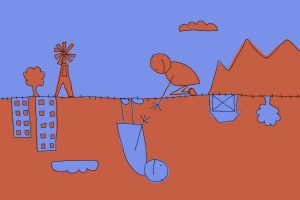Tropical storm Irene helped illustrate just how vulnerable some residents can be, but for Professor Alice Fothergill, it became an opportunity for her students to gain first-hand experience on disaster relief.
Fothergill said she has always taught sociology seminars on natural disasters, but doing service never became a possibility until Irene.
“Irene allowed us to volunteer and do research on how some groups are affected more than others,” she said. “But it also allowed students to use the concepts that they have studied and apply them in real situations.”
Some residents told the students that they don’t feel in control of the relief efforts, Fothergill said.
“A lot of the residences feel like their voices aren’t being heard,” she said. “There is a lot of dispute on how aid should be distributed and residences do not feel like they are part of the recovery process.”
For the last several weekends students have gone to Berlin where they have helped the residents of Weston’s Mobile Home Park, which suffered extensive damage from the storm, Fothergill. Students helped clean up debris, sort out belongings, salvage personal belongings and even rebuild homes.
“It is very taxing work. Not just physically, but also emotionally,” senior Iva Bugbee said. “You are helping someone that has lost everything they had. Their stories are all too real.”
Students were required to wear masks for protection from the mold in the water because it was toxic— contaminated with oil and sewage.
Some students who helped distribute clothing to those affected by the flood said that the first-hand experience was very rewarding.
“You simply can’t experience this from inside a classroom,” Bugbee said. “We read a couple of articles and saw some pictures of the Mobile Home Park, but it is completely different from when you actually witness it.”
The waterline on the mobile homes was at least five feet, there was waste up to kitchen counters and children’s toys and photo albums scattered on the roads covered in mud, she said.
The destruction had made some residents hesitant of receiving assistance, but eventually they accepted the help.
“These are people that have lost control of a large part of their lives, they were often reluctant to give up any more control,” Bugbee said. “But the most rewarding part of the whole process was watching their guard slowly come down.
Fothergill said that the aftermath of Irene will allow for change to better Vermont.
“This is our opportunity to rebuild better and safer infrastructure, to increase community engagements, to make communities safer,” she said. “The more voices that are heard in the process will be the key that will bring long term results– were people feel part of the outcome is the difference between success.”
If students would like to help, they can visit http://www.vermontcf.org/disaster-related-giving/












